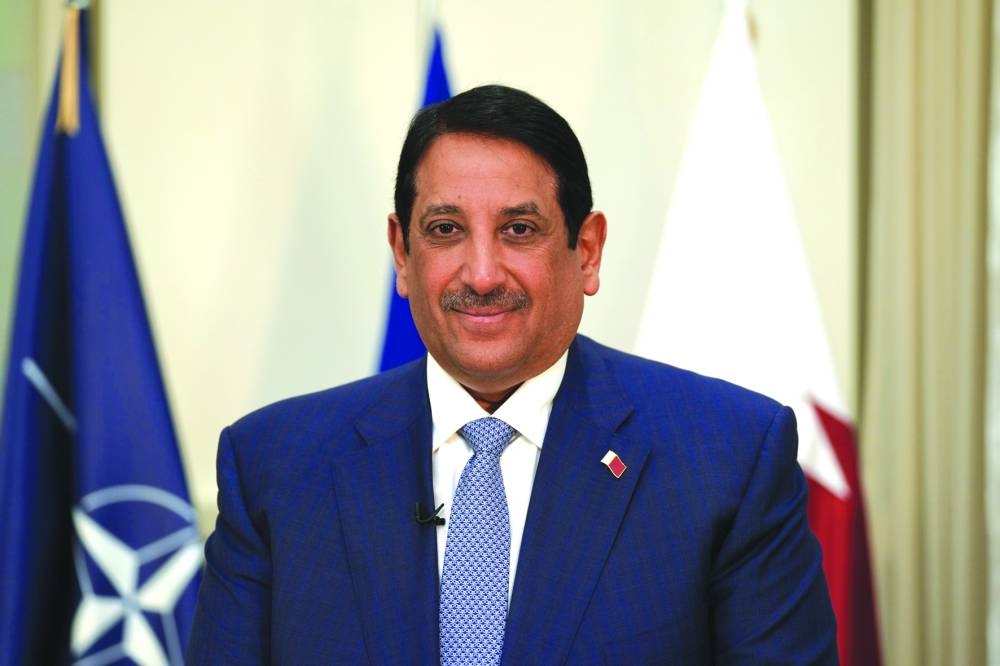Qatar's ambassador to the European Union and the North Atlantic Treaty Organisation (Nato), Abdulaziz bin Ahmed al-Jehani al-Malki, affirmed the significance of the first summit between leaders of the Gulf Co-operation Council countries and member states of the European Union, due to take place in Brussels Wednesday.
Speaking to Qatar News Agency (QNA), the ambassador said the first-ever summit since the establishment of official relations between the two sides marks a historical milestone in the path of strategic partnership between the GCC countries and the European Union, and reflects the joint commitment to bolstering the relations, in light of the growing regional and international challenges and the prevailing atmosphere of wars and geopolitical conflicts.
The summit will address many pressing issues on the regional and international scene, including security and stability in the Middle East and geopolitical conflicts, as well as trade, investment, combating climate change, industry, energy security, cybersecurity, artificial intelligence, and other topics related to innovation and scientific research. The deliberations will also touch on reducing carbon emissions, the transition to a green economy, combating terrorism, and other issues related to peoples' dealing, most notably the European Union entry visa "Schengen", he explained.
Regional issues of mutual interest to the GCC and EU will be strongly present during the summit. The leaders of the GCC and the EU countries will discuss aspects of co-operation and unifying visions on many issues, in a bid to develop a vision and an end to the crises in the region, he pointed out.
The GCC-EU summit will address all regional and international issues. The joint communique is expected to cover all the issues and conflicts currently taking place in the international community; and the outcomes of the summit will be built upon in order to strengthen the relationship between the GCC countries and the European Union, and transform the files discussed into future projects and visions, the ambassador indicated.
Ambassador al-Malki noted that the global economy is facing many difficulties as a result of the wars in the Middle East and the world, and that political stability is reflected on the economic growth of each country. Therefore, Qatar is keen on peace, security, political solutions and negotiations as a basis for resolving crises, because any economic stability is based on political stability.
His Excellency expected that the participants in the upcoming summit would come out with a strong joint communique that would send a message to the international community that crises must be resolved, wars must be avoided, a common language must be found to respect international law, and an appropriate mechanism must be established for negotiation and avoidance of conflicts that cause economic, political and social problems and waves of displacement, all of which do not serve the international community.
His Excellency expressed his hope that the joint communique of the GCC-EU summit would cover all regional, international and bilateral issues, and that the outcomes of this statement would be built upon in all future negotiations and projects; looking forward to the communique to give a clear roadmap to the international community of how to end these wars and avoid violence and conflict in the future, while emphasizing the need to respect international law.
The communique would indicate the keenness of the European Union and the Gulf Cooperation Council on upgrading the relations to a strategic stage that opens the way for broader discussions at the bilateral and international levels, addressing regional and international files, establishing a mechanism to avoid the wars and address their consequences, and developing a roadmap for dealing with the thorny files in the future, he added.
He highlighted Qatar's strong and influential role in the international arena through its mediation efforts in many regions and countries, which has earned it global trust and proven to the world its credibility and transparency in political work, pointing to its major role in many files such as the Russian-Ukrainian war and the Israeli aggression on Gaza and Lebanon, as well as the conflicts in Sudan, Yemen and Somalia, and its implementation of the largest evacuation operation in Afghanistan, not to mention humanitarian and relief aid.
The ambassador underscored the strong and firm strategic relationship between Qatar and the Nato, as evidenced by the numerous field visits and the study and implementation of a group of projects. He noted that the alliance is very interested in global stability and international peace and security, and Qatar is an active member of the international community, especially in resolving disputes through mediation and peaceful means.

Abdulaziz bin Ahmed al-Jehani al-Malki
